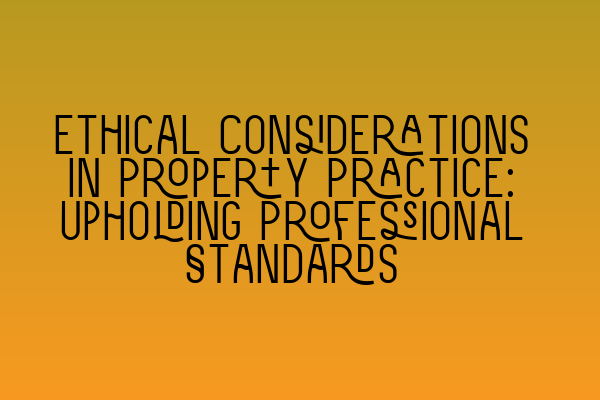Ethical Considerations in Property Practice: Upholding Professional Standards
When it comes to property law, it is imperative for solicitors and professionals to navigate the complexities of legal practice while upholding ethical standards. Ethical considerations play a crucial role in ensuring justice, fairness, and integrity in property transactions. In this article, we will explore the ethical dimensions of property practice and the importance of upholding professional standards.
The Importance of Ethics in Property Practice
Ethics serve as a guiding compass in the legal profession, including property law. They act as a set of principles that define acceptable conduct, integrity, and responsibility. Upholding ethical standards is not only important for maintaining professional credibility but also for protecting the interests of clients and promoting trust in the legal system.
Working ethically in property practice involves various aspects, including:
- Confidentiality: Respecting client confidentiality and ensuring that sensitive information is not disclosed without proper authorization.
- Conflict of Interest: Avoiding situations where personal interests may interfere with professional obligations, and ensuring that clients’ interests are always prioritized.
- Honesty and Transparency: Providing accurate and truthful information to clients, colleagues, and other parties involved in property transactions.
- Competence: Maintaining the necessary knowledge, skills, and expertise to provide high-quality legal services in property law.
- Professional Independence: Acting independently and without any external influences that may compromise professional judgment.
By adhering to these ethical principles, solicitors can build a reputation as trusted advisors, dedicated to their clients’ best interests.
The Impact of Professional Standards on Clients
Upholding professional standards in property practice directly affects the clients we represent. Clients rely on solicitors to provide sound legal advice, protect their interests, and ensure the smooth execution of property transactions. When ethical considerations are not properly addressed, it can have severe consequences for clients and the legal profession as a whole.
An ethical breach can result in:
- Loss of client trust
- Legal disputes
- Financial loss
- Reputational damage
- Legal and regulatory consequences
By prioritizing professional standards, solicitors can establish a strong professional relationship with their clients based on trust, transparency, and ethical conduct. This not only leads to favorable outcomes for clients but also contributes to the overall integrity of the legal system.
Integration of Ethical Considerations in Property Practice
Integrating ethical considerations into property practice requires a proactive approach and a commitment to upholding professional standards. Here are some key considerations:
- Client Communication: Maintaining open and transparent communication channels with clients is essential. Solicitors should provide regular updates, explain legal procedures, and ensure that clients understand their rights and obligations in property transactions.
- Conflicts of Interest: Solicitors must identify and address any potential conflicts of interest promptly. This involves thoroughly assessing the parties involved in a transaction and, if necessary, seeking independent legal advice or withdrawing from the representation.
- Due Diligence: Conducting thorough due diligence is vital in property practice. Solicitors should verify the legality of property titles, investigate potential encumbrances or disputes, and disclose any relevant information to clients.
- Transparency in Fees: Clearly explaining fee structures and any additional costs associated with legal services is essential. This ensures that clients have a comprehensive understanding of the financial aspects of their property transactions.
- Continued Professional Development: Property law is a constantly evolving field. Solicitors should engage in continuous learning and professional development to stay up to date with legal developments, ethical obligations, and best practices.
By integrating these ethical considerations into property practice, solicitors can foster a professional environment that puts clients’ interests first and upholds the highest standards of ethical conduct.
Ethics in Contract Law: Navigating the Moral and Legal Dimensions
Misrepresentation in Contracts: Unveiling Deceptive Practices
A Closer Look at SQE Contract Law Syllabus
SQE Contract Law: Analyzing Landmark Cases and Influential Judicial Decisions
Contract Law for Services: Key Considerations and Best Practices
